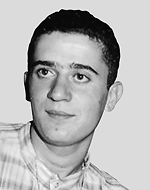Keruchi, Avi (Avraham)
The eldest son of Shoshana and Meir. He was born in Be’er Sheva on the 11th of Kislev 5740 (1.12.1979). Later his three brothers were born: Adi, Habib and Racheli. My father grew up and was educated in Be’er Sheva. He began his studies at the Beit Yaakov Elementary School and continues at the “Makif D” high school. When he turned thirteen, his parents divorced, and my father was forced to leave high school, help his mother earn a living and take on the role of head of the family. His father remarried and had a daughter, Eden. In December 1997, Avi was drafted into the IDF and began his service as a truck driver at a transport base in the Logistics Corps. He was a devoted fan of the Hapoel Beer Sheva soccer team, and after his discharge from the IDF he worked for a transportation company as a manufacident and occasionally asked to join the career army. About two years after his release, Avi was drafted into a career army service as a safari driver in Netzarim, but after a few months he was released because there was no standard. My father did not give up and tried every time to return to military service, he began to work on the construction of the separation wall on the Philadelphi Route as a crane in the company “Sami Cranes.” The IDF decided to recruit him for reserve duty on a permanent basis and was promised that he would be transferred to permanent service on June 19, 2005. On June 19, 2005, Sergeant Avi Krucci was killed in operational activity in the Gaza Strip. 10:30, two terrorists fire an anti-tank missile at the Girit outpost on the Philadelphi route, and storm our forces, which are engaged in engineering work on the Philadelphi route, as part of the construction of a separation wall between the route and the Palestinian territory. The anti-tank fire was used as a diversion that enabled the terrorists to hit our forces, they opened Kalashnikov assault rifles to the engineering personnel and the Givati soldiers who were on their side in a relatively close range. At the same time, my father’s younger brother, Haviv, a Givati soldier, sat in the war room and heard what was happening on the radio: The soldiers were talking about each other. An anti-tank missile that hit a tank that secured the force, my father was not there, and from his mouth, Haviv heard that a helicopter was collecting two seriously wounded, and the commander of the sector shouted that the tax But my father died of his wounds at the age of twenty-six, and my father was laid to rest in the military cemetery. In Be’er Sheva, leaving behind his parents, three sisters and a brother.
